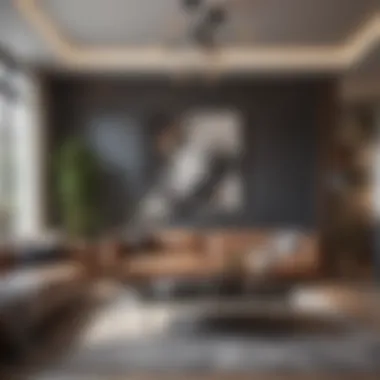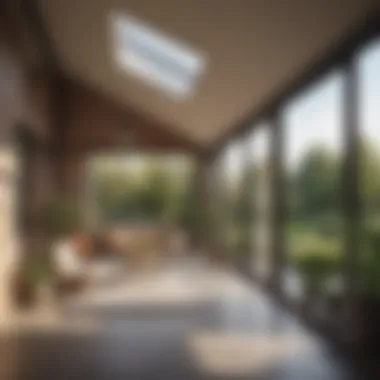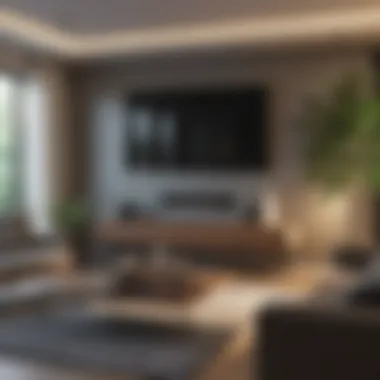Enhancing Home Value: Effective Strategies & Insights


Intro
Home value is a pivotal element of real estate considerations. In today's fluctuating market, homeowners are looking for ways to enhance their property value. This article provides insights into effective strategies that cater to both aesthetic and functional improvements in homes. Understanding these elements can lead to more informed decisions that not only raise property value but also improve living quality.
Key Insights and Trends
When considering ways to enhance a home’s value, keeping up with current trends is essential.
Current trends in interior design
Modern interior design focuses on simplicity and functionality. Homeowners are opting for open floor plans that maximize space while maintaining an inviting atmosphere.
- Neutral color palettes are popular; they tend to appeal to a broader range of buyers.
- Sustainable materials are becoming increasingly favored. Homebuyers are looking for eco-friendly options that reduce environmental impact.
- Multi-functional furniture offers practical solutions for smaller spaces, making homes more versatile and attractive.
Popular gardening techniques of the season
Landscaping is another critical aspect that can significantly enhance home value. Various gardening techniques can make a home more appealing and functional.
- Xeriscaping is popular for its low water usage and attractive designs.
- Native plants are favored for their resilience and minimal maintenance needs.
- Vertical gardening allows homeowners to maximize limited outdoor space while adding vibrant greenery.
Practical Tips and How-To Guides
Implementing these trends into practical actions can lead to substantial increases in home value.
Step-by-step guides for home decoration projects
- Choose a Color Scheme: Begin by selecting a cohesive color palette that creates flow throughout the home. For example, choose three colors that complement each other.
- Furniture Arrangement: Position furniture to encourage conversation and movement. Avoid blocking pathways.
- Accessorize Thoughtfully: Use decor that adds character but does not clutter. Aim for a few standout pieces rather than many smaller items.
Entertaining tips and planning checklists
Creating an inviting space for entertainment can also raise your home's value. Consider the following:
- Design a Welcoming Entryway: This sets the tone for visitors and makes a lasting first impression.
- Organize Your Space: Declutter to create an inviting environment. Use storage solutions that blend with the decor.
- Outdoor Space: Create an entertaining area outdoors, such as a patio or fire pit. This can greatly enhance the overall appeal.
"Investing in a home is not just about financial aspects; it is about creating a living environment that reflects lifestyle and aspirations."
Implementing these insights and practical strategies can effectively enhance your home’s value. Each step, from interior design choices to landscaping, contributes to a more appealing, functional, and valuable property.
Understanding Home Value
Understanding home value is crucial for anyone who is involved in real estate, whether you're a homeowner, a prospective buyer, or an investor. Home value is not merely about the physical structure or its location; it encapsulates various elements that combine to determine market demand and pricing. Recognizing these elements can empower sellers to position their property effectively and guide buyers toward making informed decisions. The implications of grasping home value extend beyond immediate financial benefits; they are also about maximizing the return on investment and ensuring long-term satisfaction with a property.
The Definition of Home Value
Home value encompasses the monetary worth of a property in the marketplace. It is determined by a combination of factors, including location, property size, condition, and unique features. Real estate appraisers often assess properties based on comparative market analysis, where similar properties in the vicinity are evaluated. This comparative approach allows for a more holistic understanding of a home’s value relative to its neighbors during selling or buying. Understanding how home value is defined can help homeowners prioritize improvements and strategic decisions that enhance their property’s attractiveness.
Factors Influencing Real Estate Prices
Real estate prices fluctuate due to a myriad of factors. Some key influences include:
- Location: Properties in desirable neighborhoods with access to schools, shopping, and amenities typically command higher prices.
- Market Demand and Supply: The balance of buyers and sellers in a given market can drastically shift prices in either direction.
- Economic Conditions: General economic factors including employment rates and interest rates impact people’s ability to buy homes, subsequently affecting prices.
- Home Condition: Properties that are well-maintained or recently renovated tend to fetch higher prices compared to those needing repairs.
- Unique Features: Special characteristics such as a pool, garden, or historical significance can also raise a home’s value.
Understanding these factors offers homeowners significant insight into their property’s potential worth, guiding them in making proactive improvements.
Interior Design Enhancements
Interior design enhancements play a pivotal role in elevating home value. A well-designed interior does not only contribute to aesthetic appeal but also enhances functionality and livability. Potential buyers often evaluate homes based on their design features, reflecting personal preferences and trends. Making strategic changes can lead to significant financial returns, particularly when these improvements align with current market demands.


Open Concept Layouts
Open concept layouts have gained popularity in recent years. This design approach involves removing walls between key living spaces, such as the kitchen and living room, creating a seamless flow. The resulting spaciousness often feels more inviting. Prospective buyers appreciate the versatility offered by open concept designs, as they accommodate both social gatherings and family activities.
One key benefit of open floor plans is natural light. With fewer walls, sunlight can penetrate deeper into the home, improving ambiance. However, careful planning is essential to maintain designated areas, ensuring function is not sacrificed for style.
Quality Materials and Finishes
The choice of materials and finishes can profoundly impact a home's appeal. High-quality materials not only enhance visual allure but also signal durability. Potential buyers are often willing to pay more for homes that feature premium finishes, as they suggest long-term value.
Investments in materials such as hardwood flooring, granite countertops, and bespoke cabinetry can return broader returns when selling. Homeowners should consider longevity and maintenance when selecting finishes. While more expensive options may require a higher upfront cost, the reduced need for replacements or repairs often justifies this investment.
Renovating Kitchens and Bathrooms
Renovating kitchens and bathrooms remains among the top strategies for enhancing a home’s value. These spaces are often focal points in property evaluations, drawing attention from potential buyers.
Targeting High ROI Projects
Focusing on high ROI projects is crucial in kitchen and bathroom renovations. Research indicates that updates in these areas yield some of the most significant value increases upon resale.
Specific areas within kitchen upgrades include cabinetry and appliances. Opting for energy-efficient appliances can help attract eco-conscious buyers, while stylish cabinetry can add an element of sophistication. High ROI projects ensure that the homeowner does not overspend on features that do not resonate with the target market.
Trends in Modern Kitchens
Current trends in modern kitchens emphasize functionality complemented by aesthetics. Open shelving, for instance, is increasingly favored, allowing for both display and easy access. Buyers are looking for spaces that offer both cooking capabilities and stylish elements.
Unique features such as smart home technology for kitchen appliances are gaining traction. They not only appeal to tech-savvy individuals but also promote energy efficiency. However, while integrating trends, homeowners should remain conscious of their personal design style to create a cohesive space.
Bathroom Spa-Like Upgrades
Creating spa-like upgrades in bathrooms has become a sought-after trend. Homeowners and buyers often desire retreats within their living spaces, where relaxation is paramount. Features such as soaking tubs, rainfall showers, and stone finishes contribute to this luxury feel.
The shift toward creating a serene, calming environment improves the overall impression a bathroom leaves on prospective buyers. Unique elements such as heated floors or integrated lighting can elevate the experience even more. While these enhancements can be costly, their appeal can lead to significant returns when well executed.
Energy Efficiency Improvements
Energy efficiency improvements are becoming increasingly relevant in today's housing market. These upgrades not only enhance the comfort of a home but also significantly contribute to its overall value. Homeowners benefit from reduced utility costs, while potential buyers are often drawn to properties that showcase a commitment to sustainability and lower energy consumption. There are several key areas to focus on that can yield substantial returns.
Upgrading Windows and Insulation
One of the most effective ways to increase energy efficiency is by upgrading windows and insulation. Older windows may allow heat to escape during winter and create an undesirable indoor climate during summer. By installing energy-efficient windows, such as those that are double or triple-glazed, homeowners can reduce their energy bills. Moreover, quality insulation in attics, walls, and floors plays a crucial role in regulating indoor temperatures. This investment can be beneficial in areas experiencing extreme temperature variations.
Benefits of effective window and insulation upgrades include:
- Reduced energy costs
- Improved comfort levels within the home
- Enhanced curb appeal with modern window designs
- Increased resale value as energy efficiency is a sought-after feature
Energy Efficient Appliances
The move towards energy-efficient appliances represents another significant upgrade opportunity. Outdated appliances can consume excessive amounts of energy. Replacing them with Energy Star-rated products reduces both energy consumption and utility costs. Appliances such as refrigerators, dishwashers, and washing machines with this rating can use as much as 50% less energy than standard models.
When choosing energy-efficient appliances, consider:
- Initial Cost vs. Long-term Savings: Though the initial investment may be higher, the long-term savings typically offset this expense.
- Rebate Programs: Many local governments provide rebates for purchasing energy-efficient appliances, which can further enhance the value proposition.
- Resale Appeal: Newer appliances often increase buyer interest, making properties more appealing on the market.
Solar Panel Installations
Solar panel installations are a powerful method for improving energy efficiency while adding value to a home. By harnessing renewable energy, homeowners can significantly reduce their reliance on traditional energy sources. Solar panels may require substantial upfront investment; however, they often pay for themselves over time through savings on electricity bills and tax incentives.


Key advantages to solar panel installations include:
- Reduction in Energy Costs: Once installed, solar panels can significantly lower monthly electricity costs.
- Increased Property Value: Homes equipped with solar panels are often valued higher in real estate markets, attracting eco-conscious buyers.
- Sustainability Factor: As climate awareness grows, many buyers prioritize homes that contribute to environmental sustainability.
By improving energy efficiency through strategic upgrades, homeowners can enjoy economic benefits and a more motivated market presence when selling their properties.
Smart Home Technology
Smart home technology plays an increasingly vital role in modern residential living. As homeowners seek ways to both enhance convenience and increase property value, integrating smart systems becomes a strategic investment. The demand for efficiency, security, and connectivity shapes these advancements, turning homes into hubs of innovation. Integrating smart devices not only improves daily life but also has significant implications for property valuation.
"Smart homes are not just a trend; they represent the future of residential living."
Home automation, security enhancements, and energy management systems are just a few examples of how technology can be applied. The benefits of adopting smart technology can be substantial. Real estate appraisers often view the inclusion of these systems as valuable upgrades that can command higher market prices. They offer both convenience and peace of mind, which are attractive to potential buyers.
Home Automation Systems
Home automation systems streamline household management by enabling homeowners to control various functions remotely. Connected devices, like smart thermostats, lights, and appliances, create a cohesive network that enhances both function and aesthetics. For example, smart thermostats like Nest learning can optimize energy use based on your habits, effectively lowering energy bills.
A key aspect of home automation is its potential for personalization. Homeowners can set preferences and schedule devices to suit their unique lifestyles. The allure of being able to manage everything from lighting to temperature with a smartphone app cannot be understated. This flexibility appeals greatly to buyers who value modern living solutions.
Adopting automation systems also improves energy efficiency, aligning with current sustainability trends. In a marketplace that increasingly favors environmentally conscious homes, automation will likely continue to be a strong selling point.
Security Systems
Another essential aspect of smart home technology is advanced security systems. Smart security solutions can range from video doorbells, such as Ring, to comprehensive alarm systems that alert homeowners to any intrusions. These systems typically allow remote monitoring, ensuring peace of mind regardless of one’s location.
The integration of smart technology into home security efforts provides both functionality and reliability. Systems equipped with cameras and sensors improve the overall safety of a residence, a priority for most homeowners. Security features can directly influence a home’s resale value, as new buyers often appreciate established technology that enhances their safety.
Moreover, various tools allow for automated alerts which can notify homeowners about unusual activity. This proactive approach can prevent potential threats and can save on insurance premiums. Such benefits contribute to the desirability of a property in the competitive real estate market.
Landscaping and Outdoor Improvements
Landscaping and outdoor improvements play a vital role in enhancing the overall value of a home. They go beyond mere aesthetics; they affect first impressions, property valuation, and even personal enjoyment. A well-planned landscape can transform an ordinary house into a captivating space, positively impacting curb appeal and creating inviting outdoor environments. Homeowners should consider not only the visual appeal but also how these outdoor spaces contribute to functionality and sustainability.
Curb Appeal and First Impressions
Curb appeal is the first thing potential buyers see when they approach a property. It sets the tone for what they can expect inside. A well-maintained landscape indicates that the home is cared for, which can translate to the maintenance of other aspects as well. Simple elements like fresh mulch, trimmed shrubs, and clean pathways can significantly uplift the exterior look. Adding flowering plants or ornamental grasses can also create visual interest.
Remember that it is essential to keep the yard tidy and not overcrowded. A cluttered space may project feelings of disorganization. Furthermore, investing in outdoor lighting can enhance evening aesthetics and improve safety.
Creating Functional Outdoor Spaces
Functional outdoor spaces increase the value of the home by effectively extending the living area. They allow homeowners to enjoy fresh air and nature comfortably.
Patios and Decks
Patios and decks provide a seamless transition between indoor and outdoor living. They serve as gathering places for family and friends. The key characteristic of a patio or deck is its versatile use. They can host barbecues, family dinners, or be quiet retreats for relaxation. Well-designed patios can include features such as built-in seating, fire pits, or surrounding gardens.
One unique feature of patios is the choice of materials. From natural stone to pavers, the materials can significantly influence the design and feel. While they occupy space and require maintenance, their popularity is undeniable due to the social atmosphere they can create. A patio can also increase a home's footprint without the need for a full extension of indoor space.
Outdoor Kitchens and Fireplaces
Outdoor kitchens and fireplaces are increasingly sought-after features. They offer an enticing way to entertain guests while enjoying the outdoors. The main characteristic of outdoor kitchens is their ability to expand cooking experiences beyond the indoors. Features like grills, sinks, refrigerators, and countertops allow for complete meal preparations outside.
Including a fireplace can add warmth and create a cozy ambiance, which is appealing during cooler months. However, the key consideration is ensuring that the installations are safe and comply with local regulations. While these enhancements can require considerable investment, the enjoyment they provide and the increase in property value often outweigh the costs.
Sustainable Landscaping


Sustainable landscaping focuses on creating outdoor spaces that are environmentally friendly and require less water and maintenance. This method can also positively influence home value. Using native plants reduces the need for artificial irrigation and fertilizers. Practices such as xeriscaping promote conservation by designing landscapes suited to the local climate, enhancing not only beauty but also ecological health.
Furthermore, sustainable choices may attract eco-conscious buyers who value green living. Homeowners should discuss their options with landscaping professionals to ensure well-thought-out implementations. This can lead to spaces that are not only beautiful but contribute positively to the environment.
Additional Considerations
In the quest to enhance home value, it is essential to recognize the nuanced factors that can aid homeowners in their decisions. This segment explores three primary areas: market trends and research, budgeting for home improvements, and working with professionals. These considerations are crucial as they provide a multi-faceted view on how to execute home upgrades effectively while ensuring they translate into increased property value.
Market Trends and Research
Staying attuned to market trends is vital for any homeowner seeking to add value to their property. Knowledge of current preferences in design, materials, and technology not only informs decisions but also prevents overspending on features that may soon fall out of favor. For instance, data from reputable sources like Wikipedia can reveal popular flooring types or kitchen layouts that buyers are currently seeking. It is also beneficial to observe local real estate reports, which can provide insight into neighborhood dynamics.
In a market that frequently shifts, referencing tools like the National Association of Realtors or local real estate agencies can prove advantageous. Such research will highlight what potential buyers desire in a home. Awareness of these trends can guide renovations to be more aligned with buyer expectations, thereby increasing the likelihood of achieving a good return on investment.
Budgeting for Home Improvements
Budgeting is another key consideration when enhancing home value. It is essential to approach renovations with a clear financial plan. Setting a budget helps manage overall expenses and prevents overextending one's finances, which can lead to project delays or incomplete work. A common strategy is to allocate funds based on the expected return on investment for specific projects, such as kitchen renovations or bathroom upgrades.
Homeowners can effectively organize their budget by considering priorities. Here is a simple method to help:
- List Desired Improvements: Identify the areas needing upgrade.
- Research Costs: Obtain estimates for each project from multiple sources.
- Allocate Funds: Assign a budget to each project based on its ROI potential.
- Contingency Fund: Set aside an additional percentage for unexpected expenses.
Working with Professionals
Collaborating with professionals such as interior designers, contractors, and real estate agents can streamline the home improvement process. Their expertise can maximize the potential of your investments. It is important to vet professionals thoroughly. Check references and past work to ensure they align with your vision.
When working with a professional, clear communication about goals and expectations is crucial. This will guarantee that both party's objectives match, which can prevent misunderstandings and enhance satisfaction with the outcome. Furthermore, utilizing specialists can save time and reduce stress associated with DIY approaches.
Working with qualified professionals could include:
- Architects for structural changes
- Landscape designers for outside space enhancements
- Certified energy auditors for energy efficiency upgrades
"The right specialist can lead a project from concept to completion, ensuring quality and adherence to local codes and regulations."
Overall, effective consideration of these additional aspects will not only contribute to a smoother renovation journey but also significantly impact the home’s value in the long run.
Final Thoughts on Adding Home Value
The topic of enhancing home value plays a crucial role for homeowners and potential investors. This article delves deep into several strategies that enable individuals to make informed decisions about which improvements yield the best returns. Understanding the interplay of aesthetics and functionality is vital for maximizing property value. Each enhancement discussed not only elevates the livability of the home but also contributes significantly to its marketability.
Consider the wise allocation of resources when implementing these changes. Whether one opts for major renovations or smaller adjustments can influence long-term property returns. Homeowners should strategically plan to align with current market trends and personal preferences.
Incorporating thoughtful upgrades can enhance the quality of life while simultaneously addressing potential buyer expectations. This dual focus is critical in moments of sale, making the property stand out in a competitive market.
Long-Term vs. Short-Term Value Gains
When weighing the benefits of home enhancements, it is important to distinguish between long-term and short-term value gains. Short-term improvements often involve minimal investment but provide immediate satisfaction. These can include fresh paint, landscaping, and minor repairs. While these actions may not dramatically inflate home prices, they can create more appealing spaces for living and entertaining.
On the other hand, long-term improvements typically require a higher commitment but can yield significant returns upon selling.
- Remodeling kitchens or bathrooms: High ROI projects often reflect latest design trends and functional needs.
- Adding square footage: Extra rooms or expansive living areas tend to attract buyers.
- Energy-efficient upgrades: Investing in energy-efficient systems can reduce utility costs and intrigue environmentally conscious buyers.
Evaluating each type of enhancement can help determine the most effective path toward increasing overall home value.
The Importance of Personal Style
Personal style plays a fundamental role in enhancing home value. While trends may dictate certain elements of design, individuality allows a home to speak to potential buyers. Customizations that reflect unique tastes often resonate well with those searching for a new residence. This uniqueness can differentiate a property amidst a sea of standardized homes.
However, it is essential to strike a balance. Homeowners should consider the neighborhood and general market when expressing their personal style. Following are some ways to integrate personal style while maintaining broader appeal:
- Accent walls with colors that are not overly bold, ensuring they are still attractive to most buyers.
- Artistic details like custom cabinetry that reflects personal preference without being too niche.
- Outdoor spaces thoughtfully designed for enjoyment and entertainment, appealing features for communal gatherings.
Adhering to these principles aids in creating a home that feels personalized while also being inviting to a wider audience. Furthermore, it ensures that the property retains its value regardless of market fluctuations.



